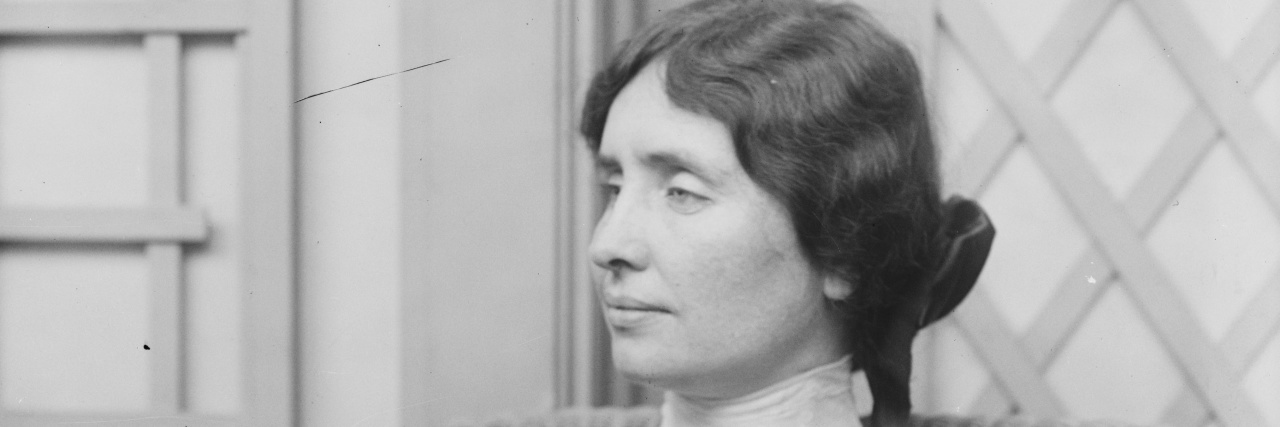There is an idea that has gained a lot of momentum with young people. Social media platforms like TikTok have given it an environment where it has been able to spread and thrive. It is the ludicrous idea that the late great Helen Keller never really existed.
A now-deleted, but archived post on Medium by Isabella Lahoue from last May that has been making the rounds on Twitter explains the phenomenon well. In the piece, Lahoue tells us why she and so many others from her generation have embraced Helen Keller denialism.
Her article is really about how the internet has made her generation care more about searching for truth than previous generations (I’ll let you evaluate her argument yourself), but she uses Helen Keller as a case study. The young people are puzzled: How could so many previous generations never question this “ridiculous” story?
She credits the popularity and style of TikTok as the driving force behind the widespread debunking of what Gen Z sees as something of an urban legend:
“In the TikTok fashion, the videos both satirically and seriously question the unbelievability of Helen Keller’s life.” I added the emphasis to highlight what I see as the real issue here.
Why does she assume the unbelievability of Keller’s story is a given? Why can she conclude, “We don’t have to believe in Helen Keller, and it shouldn’t be surprising if we don’t”?
She writes with the assumption that it is obvious to everyone reading that it is outrageous to believe someone with disabilities like blindness and deafness could be intelligent and driven enough to accomplish all that Helen Keller did in her incredible life.
Think about what is being communicated here.
Consider the irony in the fact that Lahoue discusses the egregious injustices that plague our world (leading to the younger generation’s trust issues in the first place) while simultaneously expressing the same type of attitude toward disabled people that leads to things like “the injustices committed at the border, against the Black community, and against women.”
Injustices committed against marginalized groups come from a collective assumption that my ethnic background, or my social group, or my economic class, or my intelligence, or my gender, or whatever category we are talking about is better or more important than others. We have become very familiar with terms like xenophobia, sexism and racism. We know what those words mean. And while we have not successfully eradicated such things from society, we have identified these problems enough to give them names. There is another term that we as a society must bring into our collective vocabulary with more prominence: ableism.
Ableism is the assumption that people with disabilities are inferior in value or importance or capability to the able-bodied. The issue here is not that this younger generation cares more about truth than older generations (at least not when it comes to Helen Keller). The issue is that young people are just as prone to ableism as any other generation.
Ableism is the reason why memes and TikToks about Helen Keller being a myth can go viral and win over so many believers. She was blind? She was deaf? There’s no way she accomplished such amazing things!
Back in November, Chris Nikic became the first person with Down syndrome to complete a full Ironman. He swam 2.4 miles, rode his bike for 112 miles, and then ran 26.2 miles. It was an amazing feat, but I think the way that many people reacted to his accomplishment highlights the issue of ableism. Many had the impulse to make his story all about inspiration. If he can accomplish his dreams, so can the rest of us! If he can do an Ironman, so can I!
On the one hand, yes, Chris Nikic is an inspiration. By all means, look up to him and be inspired! On the other hand, be careful not to diminish his accomplishment by thinking, “Hey, if a guy with Down syndrome can do it, so can I!” He’s more than just our inspiration. He’s an athlete. There’s a good chance you and I cannot actually do what he did.
Understand that a man with Down syndrome accomplished something you literally may never be able to do.
Helen Keller was a disabled woman who accomplished incredible things. She’s an inspiration. But she’s more than that. She was an intelligent and driven person. She tapped into her talents and worked hard to exceed the limits the world placed (and continues to place) on her.
She was more capable than a lot of us. That truth may cause you to think that her story is unbelievable, but that’s only because you look down on the disabled.
So as younger generations use the technology available to them to seek out truth, I encourage them to type “ableism” into that Google search bar. It’s an exercise we should all do, really.
At a time when it has become common coin to hear things like, “Only the vulnerable are at risk of dying from Covid,” we need to search our hearts to see if we are prone to diminish the value and dignity of disabled people. Consider the dangerous nature of that insidious thing which may be lurking in your own heart, confront it, and seek different attitudes.
And my goodness, let’s make sure that Helen Keller is taught about in schools.
This story originally appeared on Adam’s Notepad.
Image via Wikimedia Commons.

